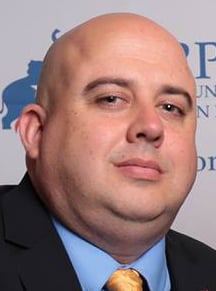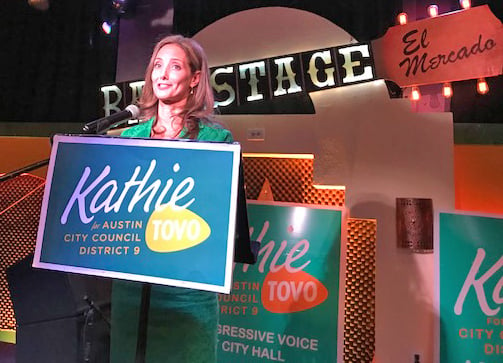People are already hustling signatures to get this measure on the November 6 ballot

Michael Searle is a tall man who’s undertaken a tall order. Searle, who earlier this year resigned his position as aide to District 8 Council Member Ellen Troxclair, is heading up a new petition drive to gather the signatures of 20,000 registered voters—and get it done in 60-some days.
Gathering the signatures of 20,000 registered voters requires a tremendous effort under any circumstances. But for the Austin Efficiency Audit Petition (copy linked below) to get on the November 6, 2018, ballot, it would have to be finished and submitted to the City Clerk by July 20, 2018.
That’s just 56 days from today. The petition drive started no more than 10 days ago. So to make that deadline the total time for gathering signatures would be only about a third of the six months allowed by law to complete the job of buttonholing passersby.
But with a fat bankroll that allowed him to hire paid petitioners instead of relying solely on volunteers, it’s possible this lightning fast effort will succeed. However, unless a website is set up to publish the petition online where people could download and sign it—a tactic that worked well in IndyAustin’s CodeNEXT petition drive—the process will have to rely entirely on face-to-face solicitation.
Citizens for Accountable Austin is a newly formed political action committee (PAC) that’s already put paid petitioners on the streets and in Austin’s public spaces to gather signatures.
In a May 24, 2018, phone interview, Searle told The Austin Bulldog that he is the treasurer for Citizens for Accountable Austin PAC but the City Clerk’s website for campaign treasurer appointments does not yet reflect that appointment.
The Texas Ethics Commission’s Instruction Guide for Appointment of a Campaign Treasurer by a Specific-Purpose Committee states, “A specific-purpose committee must file a campaign treasurer appointment before it can accept more than $500 in political contributions or make more than $500 in political expenditures.” The Guide states the treasurer appointment must be filed with the City Clerk if the committee supports or opposes a measure to be submitted at an election ordered by the city.
$100,000 raised to run the petition drive
Searle said the Citizens for Accountable Austin PAC has itself not yet gathered any contributions. But he said that an associated 501(c)(4) nonprofit, called Accountable Austin Action, has already raised “about $100,000” to fund the petition drive.
Accountable Austin Action paid to run a pilot test, Searle said, with the goal of determining whether the audit was a popular issue and people would sign the petition. With the test completed and the level of interest running high, the petitioning began in earnest.
“We did a poll and got 82 percent support for the audit,” Searle said. “There is a lot of interest in an efficiency audit, to make sure taxes are spent most efficiently.”
Money raised by Accountable Austin Action may be funneled into to the Citizens for Accountable Austin PAC.
Donors names being kept secret
The identities of the donors to Accountable Austin Action, a 501(c)(4) nonprofit, may be shielded, according to OpenSecrets.org, which cites a surge in the number of politically active nonprofits following the 2010 Supreme Court decision in Citizens United v FEC. Most of the growth comes from 501(c)(4) or “social welfare” organizations.
IRS rules for 501(c)(4) organizations state they must be operated exclusively for the promotion of social welfare. Contributions to the 501(c)(4) are not tax deductible.
The IRS oversees 501(c)(4) groups and “they aren’t required to provide detail about where they’re getting their money or how they’re spending much of it,” states the Open Secrets website.
Accordingly, Searle declined to name the donors who put up that $100,000.
Thus, whatever money from Accountable Austin Action winds up in the Accountable Austin PAC, the PAC’s campaign finance report, due July 15, 2018, will not reflect the names of those donors. The PAC will only have to report the names of donors who made contributions directly to the PAC by June 30, 2018.
When the Bulldog noted that pushing a petition funded by unnamed financial backers might be counterproductive, Searle said, “Of course people are going to be interested in where the funds are coming from. What we paid for so far is the pilot project, paid out of the (c)(4). I can’t disclose those.”
When it was pointed out that there was no legal reason that bars disclosure of the (c)(4) donors, Searle said, “They gave on the assumption they would not be named.”
In addition to Searle, the Accountable Austin Action board members are attorney Fred Lewis, and Ed English.
When Lewis was asked if it didn’t seem odd to hide the names of donors, he replied, “I don’t know. I know I can support the petition.”
English responded regarding to the idea that the public won’t know where the money is coming from, saying, “That’s something you’re measured against in court of public opinion. It’s an important issue but it’s not primary. That shouldn’t be what people focus on.”
“Hopefully we will be judged on the petition,” he said.
Who’s ramrodding the fast-paced petition drive?

Searle said that Bob Cornelius, owner of the 90 Degrees Agency, was hired to head up the petition drive.
“He came highly recommended from folks in the campaign world,” Searle said.
On his personal Facebook page, Cornelius describes himself as a “Conservative Christian Liberty Loving Texan. I own the 90 Degrees Agency which helps conservatives WIN!” There’s a photo of him on the page with a smiling Governor Greg Abbott.
In a two-minute telephone interview May 24, 2018, Cornelius said, “We’re working pretty hard and the numbers look pretty good to me. I think we’re well on the way. I have no doubt we’ll get the signatures we need.”
As soon as Cornelius was asked what previous petition drives he had conducted, the call abruptly ended and Cornelius texted to request that, because of the “bad connection” he wanted the questions emailed. I emailed eight questions to him shortly before 4pm yesterday, among them: Has he worked with the smiling governor in the photo? What petition drives as he run before? How many paid petitioners has he employed? Will he be hiring others?
He has not responded.
City Clerk needs petitions sooner
Searle said the required petition signatures must be submitted to the City Clerk for verification by July 20, 2018.

But City Clerk Jannette Goodall responded to The Austin Bulldog’s questions via email yesterday to say that while there is no statutory deadline for filing an initiative petition, if anyone had asked, she would have requested that initiative petitions be filed by the second or third week of June.
“It takes us approximately three weeks to validate a petition that contains over 20,000 signatures,” she said.

The reason she needs the initiative petition earlier, she said, is the filing period for candidates to request a place on the ballot—which runs from July 23 to August 20—also is the period during which candidates may file signature petitions in lieu of paying a filing fee. The only candidate known to be running a petition campaign is incumbent Council Member Kathie Tovo, who may be term limited and is seeking signatures to get on the ballot again.
“Those petitions would take priority over other petitions since they are part of the application for a place on the ballot, which has to be reviewed and processed within five days.”
So, it’s possible that the Austin Efficiency Audit petitioners have less than 56 days to finish gathering signatures.
Goodall said the deadline for the City Council to order an election for the November 6, 2018, election is August 20, 2018.
What if petition drive doesn’t file in time?
Searle has a Plan B. He said if the petition drive isn’t completed in time to make the November 6, 2018, ballot, then signature gathering could continue for the full six months to force an election in May 2019.
“If we don’t make the November ballot the petition could still be valid for a May election,” although ideally it would be in November when there’s a larger turnout, he said.
But wouldn’t a May election would come at a high cost to conduct?
“Yes, with our petition being fiscally oriented, it would cost $600,000 (to hold a May election). My counter would be that $600,000 pales in comparison” to the size of the $4 billion City budget and a general fund of about $1 billion.
For example, he said the City doesn’t have the money to keep its pools open, and the audit might achieve savings of 6 percent to 10 percent, or upwards of $400 million over time. That’s the percentages of savings realized by the City of Seattle and the State of Kansas, he said.
What the petition would require
The Austin Efficiency Audit Petition states “Austin shall perform a municipal efficiency audit in order to provide an impartial, objective inventory of the city’s operational and fiscal performance.
“Using the result, a Government Efficiency Blueprint (Plan) will be presented to the Mayor, Council and all citizens which includes a comprehensive budget analysis, efficiency and enhancement recommendations, and a targeted list of opportunities for operating savings.
“The study will be conducted by an independent third-party entity with extensive experience in government efficiency, which will produce a Plan that recommends specific opportunities to increase the quantity and quality of services and reduce tax burdens and utility costs. The Plan will identify specific targets for program efficiencies, cost savings, revenue enhancements, private/public partnership initiatives, and monetization of unused or underutilized city assets.”
The back page of the petition contains a Proposed Efficiency Study Ordinance that provides much greater detail about how the Efficiency Study would “be conducted by an independent third-party entity with extensive experience in government efficiency.”
If put on the ballot and approved by voters, the Ordinance would require the City to issue a Request for Proposals, receive responses, and hire the consultant.
Searle provided a copy of a report on “Government Efficiency Reviews” conducted by one such company, Alvarez & Marsal (A&M Public Sector Services LLC), which has worked with state and local government agencies. (Copy linked below.)
The three-step Government Efficiency Blueprint process outlined by A&M Public Sector includes: (1) budget analysis, (2) efficiency and enhancement recommendations, and (3) implementing a targeted list of opportunities.
A&M Public Sector has conducted these reviews in a range of government agencies, according to its report, including the states of Kansas, Rhode Island, and Wyoming; Detroit public schools; and the City of Seattle. It claims savings of $53 million a year in Detroit schools. In Kansas, where the firm contracted with the state legislature, it claims to have achieved efficiency, costs savings, and new revenue opportunities exceeding $2 billion for the state over five years.
Searle envisions the City of Austin’s implementation of recommendations would be achieved in three phases: short-term (zero to 12 months), mid-term (one to three years), and long-term (three to five years).
“We’re really excited about it,” he said. “It’s really serious for the city in an affordability crisis.”
Recalling his experience as a council aide through multiple annual budget cycles, he said, “There are things the city can’t afford to do and at the end of the budget approval process the council members are fighting over $5 million” that’s left to be allocated.
“The City is not looking at existing programs and infrastructure to find efficiencies and savings. That’s a really important thing to do,” Searle said.
Board member backgrounds

Lewis is one of the attorneys involved in a lawsuit against Central Health to challenge the way the agency spends taxpayer money, particularly giving the University of Texas Dell Medical School $35 million a year. (Birch et al v. Travis County Healthcare District dba Central Health et al, filed October 18, 2017, Cause No. D-1-GN-17-005824).
Lewis also drafted IndyAustin’s CodeNEXT petition that was ruled sufficient by the City Clerk. The City Council yesterday voted 6-4 not to put the petition on the ballot, and Lewis said he will file a lawsuit over that as well.
“I’m a big believer that money should not be wasted,” Lewis said. “There are a lot of higher priorities than the way the city of Austin is spending its money.”
“We only have limited resources as a community and money should be spent on highest priorities and spent efficiently,” he said.

English was the guy who dreamed up the idea of having an independent audit of Austin way back in early 2015, right after the first 10-1 council was sworn in to represent geographic districts. That’s when he formed a loose-knit organization called Audit Austin.
An early 2015 flier announcing the Audit Austin group, said, “Now Austin is united again to address our common issue—a lack of transparency from City staff in how city dollars—your tax dollars—are spent. Our newly elected Council members are left in the dark when it comes to decision-making and the best way to spend the City’s budget.”
Now, more than three years later, English’s dream has a chance to become reality.
“It’s my cause and has been a long time,” he said in a May 23, 2018, phone interview. “Michael brought up a petition drive. My advice was to him, ‘Are you sure you have enough time? I’ve done this before.’ ”
“If the City through this audit can find waste, fraud, and inefficiency, we could use that money for other things the city needs. Or have the ability to restrain tax-rate increases. A lot of people in town are feeling the pinches.”
English is a veteran petitioner. He was heavily involved in past petition drives including Austinites for Geographic Representation, which got the City Charter change for geographic districts on the ballot and passed, and the IndyAustin petition that got the CodeNEXT petition completed and submitted 32,000 signatures.
“If we get enough people on the streets real fast this petition will sell really well,” English said.
Don’t miss another scoop. Sign up for our free Bulldog News Alerts.
Links:
Austin Efficiency Audit Petition including Proposed Efficiency Study Ordinance (2 pages)
Government Efficiency Reviews, Alvarez & Marsal Public Sector Services (4 pages)
Texas Ethics Commission, Appointment of a Campaign Treasurer by a Specific-Purpose Committee (12 pages)
Trust indicators:
 Ken Martin has been covering local government and politics in the Austin area since 1981. See more on Ken on the About page. Email [email protected].
Ken Martin has been covering local government and politics in the Austin area since 1981. See more on Ken on the About page. Email [email protected].
Who funds this work? This report was made possible by contributions to The Austin Bulldog, which operates as a 501(c)(3) nonprofit for investigative reporting in the public interest. You can help support this independent coverage by making a tax-deductible contribution.
An alphabetic list of donors who have contributed to The Austin Bulldog since the organization was formed in 2009 and the cumulative amount each person has given through April 30, 2018, are listed on the Contribute page.
Comments are welcome: If you would like to post your reaction to this story, please do so on the Bulldog’s Facebook page.







